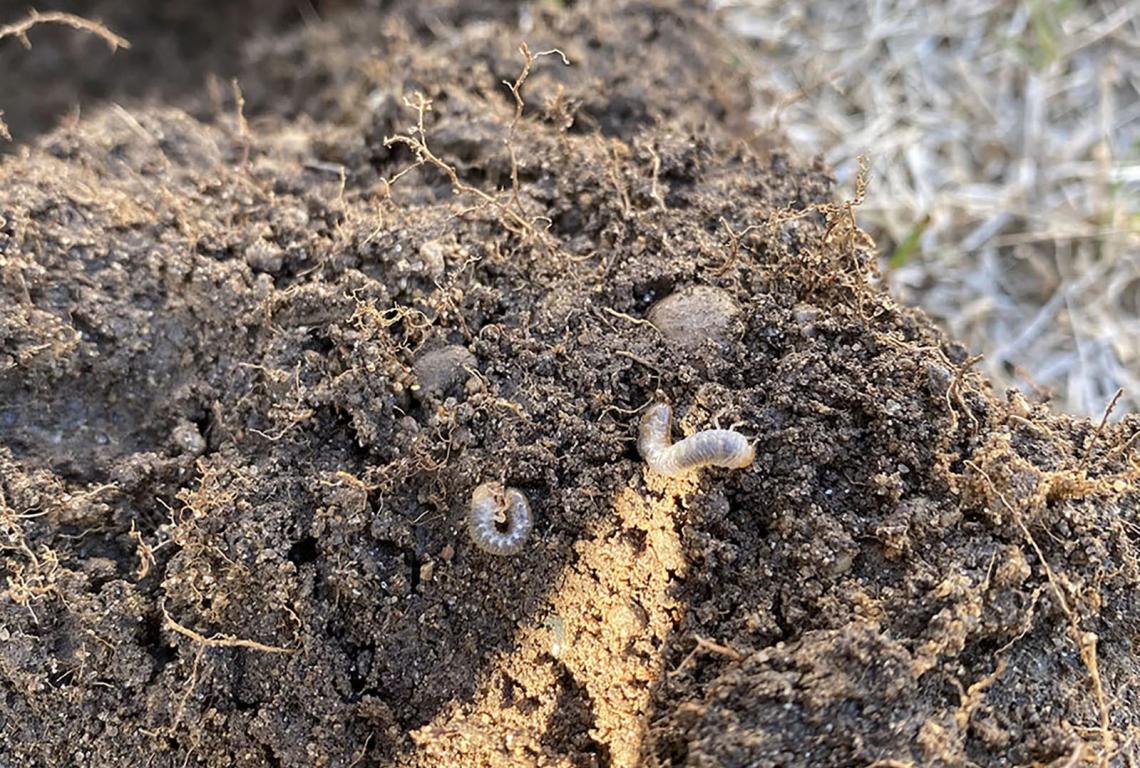Grub Control in South Charlotte, NC
Understanding Our Trusted Grub Treatment Services
Beetles seek grassy lawns to plant their eggs, and those eggs grow into larvae that eat your grass’s roots and cause brown patches of dead grass around your property. This underground pest infestation type can affect the proudest homeowners doing all they can to care for their grass and keep it in top condition. The best method to fight against a grub infestation is getting help from highly trained lawn care specialists. Lawn Pride of South Charlotte offers grub control programs in South Charlotte, NC to prevent grubs from infesting and becoming a serious problem in your lawn. We invite you to keep reading for more information about our grub control services, and then you can contact us to schedule lawn care.
Signs Your Property Has a Grub Infestation
Many homeowners have grub problems in their lawns that they don't know about, and the only way to solve this issue is to identify them first. Grubs live underground for the majority of the calendar year, so a grub infestation may just look like unhealthy grass above the soil. We've listed a few common signs of grub infestations. If any of the following infestation signs appear on your lawn, you need Lawn Pride of South Charlotte’s lawn grub control services to eliminate your grub problem and protect your property against grubs getting out of hand. The following are some common signs your lawn has grubs living in it:
- Dead Grass – Grub damage in your lawn may show up in many forms. However, dead grass is the most common indicator of a grub infestation. Grubs primarily eat underground organic material, such as your grass roots. This root and material consumption cuts off your grass’s main source of nutrients and water and causes it to die.
- Beetles – Grubs are simply larval forms of Japanese Beetles, masked chafer beetles, June bugs, and other beetles. Some beetles are invasive species without natural predators to control their populations, such as Japanese Beetles. These insects typically come out from their underground homes between May and July and make themselves visible. However, the exact time they emerge can vary by weather conditions and your property's location.
- Rolling Dead Grass – This is the most reliable way to identify grubs in your yard. If you suspect grubs have invaded a section of your lawn, try to lift the grass in that section. Extensive grub infestations will let you easily roll that grass section like rolling up a piece of carpeting. You will probably be able to see a few grubs in your soil when you do this.

Preventative Treatments vs. Curative Treatments
There are two main forms of grub treatments: preventative and curative. Lawn care professionals perform preventative grub control treatments to kill larvae before they hatch or grow active enough to cause lawn damage. On the other hand, the solution to active grub infestations is curative treatments. This treatment option destroys grubs that have grown larger and started eating your grass, causing rapid damage and brown spots of dead grass. In reality, the majority of homeowners facing grub problems get the best treatment results by enlisting a program that combines preventative and curative treatments. We can apply these treatments at different times during the calendar year so that they correspond to the invasive grubs’ lifecycle.

Frequently Questions About Our Grub Control Program
You might be slightly confused by grub control at first unless you have professional training in comprehensive lawn care solutions. While Lawn Pride of South Charlotte’s team will always gladly answer all your questions while inspecting your yard for a grub infestation, we have answered a few of our most commonly asked grub questions to educate you about how we approach grub control.
What Are Grubs?
Grubs are the larval stage of beetles, and beetles lay their eggs under the soil. These eggs hatch and grow into larvae, which eventually form a pupa and then an adult beetle that hatches out of that pupa. Grubs start as very small worms in their larval form, growing into inch-long, yard-destroying pests resembling worms. Grubs usually grow in large clusters, so finding one grub in your lawn typically means there are more living in your soil.
Will Winter Kill Off the Grubs Living in My Lawn?
In reality, winter won’t kill off grubs infesting your lawn. Cold weather may kill some grubs, but it won’t treat an infestation effectively enough to eliminate all of them. As temperatures drop in colder months, grubs burrow deeper underground to insulate themselves from the coldest weather hitting your neighborhood. When spring weather leads to warmer soil, the grubs climb closer to your lawn’s surface, eat the roots of your grass, and repeat their lifecycle.
What Time of Year Is Best for Grub Control Services?
The best grub control schedule for your lawn depends on your home’s location and weather conditions throughout the year. Generally, the most successful preventative grub control treatments happen when the grubs in your lawn are ready to hatch and begin feeding on roots and other organic materials. This stage typically occurs sometime between April and July. Curative treatments are your best option when the intrusive grubs enter their mature stages of life during mid-to-late summer. Lawn Pride of South Charlotte’s grub control specialists will gladly work with you to create the most effective grub control schedule to keep your lawn healthy and eliminate any grub infestations.

Request a Free Estimate for Grub Control
Lawn Pride of South Charlotte is a lawn care company that offers more than other lawn care professionals. We also offer grub control programs to resolve and prevent grub infestations and lawn damage. While we have the equipment and expertise to provide all your property needs to keep its grass green and healthy, our grub control programs are an added level of essential yard care.




